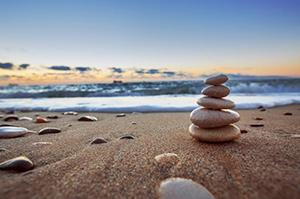Work Life Balance for MBAs? Yeah Right...
By John Stayton
Executive Director of Graduate and Executive Programs
School of Business and Economics
To be perfectly honest, I kind of suck at work life balance. And yet I have advanced knowledge and experience with work life balance. How is this possible?
Once upon a time, before the year 2000, I had a wonderful lifestyle business selling high-tech machinery. In the late nineties, I worked about 25 hours per week and earned more than I make now. I achieved work life balance! But that work had no personal meaning beyond supporting my family. After my wife and I bought our small Sonoma County farm and my son was squared away for college, I had to find work that served a greater purpose than being a good lifestyle business. In 2000, I decided to become an educational entrepreneur, causing my income to collapse to a third of what it had been while working three times as many hours. My new work was very meaningful, but in short order it was also burning me out. That is when I started my journey of re-establishing work life balance at a greater level of work responsibility.
The path of mastering an activity is a path of practice. Yo-Yo Ma is a master of the cello, which means he mastered how to practice. He practiced extensively and continues to practice. I am working on achieving mastery of work life balance. I make the achievement of work life balance more and more difficult because my pursuit of purposeful work keeps leading me to take on new challenges. This forces me to keep trying new practices. I have tried getting up early, meditating, doing yoga, spending morning time planning my day, exercising, hiking, using planners, reading books on time management, drinking wine, eating healthy, taking personal retreats, and on and on. Somehow, my life and career have a way of squeezing disciplines out of my life (with the exception of drinking wine!). Because I perpetually need to revise or renew my disciplines, I have a lot of practice developing and applying work life balance disciplines.
All of the Sonoma Professional, Executive and Wine MBA students have similar time management issues, because all of them have taken on a major new educational challenge serving a greater purpose in their lives that only adds to their workload. Nearly all of our students have full-time professional positions, and many have young children. One of the "meta-skills" they develop as a result of their education (that is not part of the curriculum) is the ability to manage their lives with a much more intense workload. How each student does this is unique, shaped around the personalities, proclivities and life situations of the individual. This is a characteristic of advanced practice in work life management - there are no cookie cutter approaches that work for all. Busy executives and MBA students need to select and try out practices that might work for them. Because we are forced to manage multiple priorities, we somehow manage to make it all work.
Work life management is different from work life balance. Interestingly, we find that our graduating students place a higher value on work life balance as a result of their MBA experience. Because of all the practice they have had managing multiple demanding priorities, they are much more likely to achieve this balance, even as they take on increasingly challenging work assignments. This is one of the many benefits of an MBA experience that is not in the curriculum!



